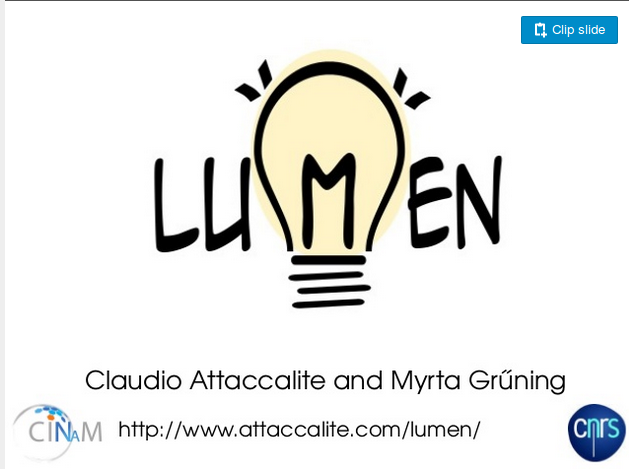Lumen
Lumen is a code based on Yambo 5.3.0 that implements a new approach to study non-linear response in solids and nanostructures based on a real-time evolution of an effective Schödinger equation.


News
- 02/07/2025: Lumen is back!! .
After many years Lumen is back, now based on Yambo 5.3.0. You can find our code in GitLab: Lumen.
- 07/06/2019: Lumen is merged in Yambo 4.4.0.
All the non-linear part of Lumen has been merged back in Yambo version 4.4.0 that will be released soon. Stay tuned on the Yambo website.
- 05/10/2018: Lumen 1.3 is online.
Version 1.3 of Lumen is online. In this new version interrupted runs can be analized by means of ypp. A new test for collisions is added to compare collision in g-space and Kohn-Sham space.
- 16/01/2018: Lumen 1.2 is online.
A new version of Lumen is available online. In this new version the real-time Bethe-Salpeter equation has been implemented in terms of collisions as described in the appendix of Phys. Rev. B 84, 245110(2011).
- 22/11/2017: Lumen 1.1 is online and a new tutorail on Third Harmonic Generation is available
A new version of Lumen is available online. This version corrects some small bugs and improve parallelization for the real-time Bethe-Sapter equation and on OpenMP.
A new tutorial on calculation of Third-Harmonic Generation in bulk silicon with Lumen is available here. - 07/11/2017: Lumen 1.0 is online
We are proud to annunce that lumen version 1.0 is available online.
Here a short presentation of the code.
- 27/06/2017: Polarized light
Circular and linear polarized light can be used to study non-linear response, with input lumen -u -V nl. - 27/06/2017: Spin-orbit coupling
Spin-orbit coupling can be included in non-linear calculations. - 03/05/2017: Real-time Bethe-Salpeter code
We have released the real-time Bethe-Sapeter code with a tutorial. Notice that RT-BSE can be used only with a local exchange (NGOscll=1) or including few g-vectors due to its high computational cost, an improved version will be released soon.